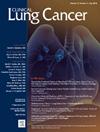Landscape of Clinically Relevant Genomic Alterations in the Indian Non-small Cell Lung Cancer Patients
IF 3.3
3区 医学
Q2 ONCOLOGY
引用次数: 0
Abstract
Background
The genomic landscape of non-small cell lung cancer (NSCLC) in the Indian patients remains underexplored. We revealed distinctive genomic alterations of Indian NSCLC patients, thereby providing vital molecular insights for implementation of precision therapies.
Methods
We analyzed the genomic profiles of 325 lung adenocarcinoma and 81 lung squamous carcinoma samples from Indian patients using targeted sequencing of 50 cancer related genes. Correlations between genomic alterations and clinical characteristics were computed using statistical analyses. Additionally, we identified distinct features of Indian NSCLC genomes by comparison across different ethnicities.
Results
Our genomic analysis revealed several noticeable features of Indian NSCLC patients. Alterations in EGFR (45.8%), TP53 (27.4%), ALK (11.4%) and KRAS (10.2%) were predominant in adenocarcinoma, with 68% eligible for targeted therapies. Squamous carcinoma exhibited prevalent alterations in TP53 (40.7%), PIK3CA (17.3%), and CDKN2A (8.6%). We observed higher frequency of EGFR alterations (18.5%) in lung squamous carcinoma patients, significantly distinct from other ethnicities reported till date. Beyond established correlations, we observed 60% of PD-L1 negative squamous patients harbored TP53 alterations, suggesting intriguing therapeutic implications.
Conclusions
Our data revealed unique genomic variations of adenocarcinoma and squamous carcinoma patients, with significant indications for precision medicine and clinical practice of lung cancers. The study emphasizes the importance of clinical utility of NGS for routine diagnostics.
印度非小细胞肺癌患者的临床相关基因组畸变情况
印度患者非小细胞肺癌(NSCLC)的基因组情况仍未得到充分探索。我们揭示了印度 NSCLC 患者独特的基因组改变,从而为实施精准治疗提供了重要的分子见解。我们利用 50 个癌症相关基因的靶向测序分析了印度患者的 325 例肺腺癌和 81 例肺鳞癌样本的基因组图谱。通过统计分析计算了基因组改变与临床特征之间的相关性。此外,我们还通过对不同种族进行比较,确定了印度 NSCLC 基因组的不同特征。我们的基因组分析揭示了印度 NSCLC 患者的几个明显特征。腺癌中主要存在(45.8%)、(27.4%)、(11.4%)和(10.2%)的基因变异,其中68%符合靶向治疗的条件。鳞状细胞癌(40.7%)、(17.3%)和(8.6%)出现了普遍的基因改变。我们在肺鳞癌患者中观察到较高的改变频率(18.5%),这与迄今为止报道的其他种族有明显不同。除了已建立的相关性,我们还观察到 60% 的 PD-L1 阴性鳞癌患者携带 TP53 基因改变,这表明其具有耐人寻味的治疗意义。我们的数据揭示了腺癌和鳞癌患者独特的基因组变异,对肺癌的精准医疗和临床实践具有重要意义。这项研究强调了 NGS 在常规诊断中的临床应用的重要性。
本文章由计算机程序翻译,如有差异,请以英文原文为准。
求助全文
约1分钟内获得全文
求助全文
来源期刊

Clinical lung cancer
医学-肿瘤学
CiteScore
7.00
自引率
2.80%
发文量
159
审稿时长
24 days
期刊介绍:
Clinical Lung Cancer is a peer-reviewed bimonthly journal that publishes original articles describing various aspects of clinical and translational research of lung cancer. Clinical Lung Cancer is devoted to articles on detection, diagnosis, prevention, and treatment of lung cancer. The main emphasis is on recent scientific developments in all areas related to lung cancer. Specific areas of interest include clinical research and mechanistic approaches; drug sensitivity and resistance; gene and antisense therapy; pathology, markers, and prognostic indicators; chemoprevention strategies; multimodality therapy; and integration of various approaches.
 求助内容:
求助内容: 应助结果提醒方式:
应助结果提醒方式:


